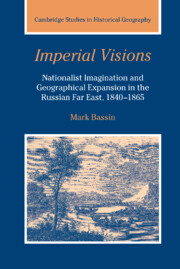 Imperial Visions
Imperial Visions Published online by Cambridge University Press: 06 July 2009
I came to know Dr. Mark Bassin well during his graduate studies at the University of California in Berkeley. I remember how shortly after we met he asked me to speak Russian with him as much as possible. To be sure, he already read fluently and could use a variety of Russian sources. But he also wanted to speak the language correctly and to be as close to the Russian tongue and Russian culture as possible. So we spoke Russian, and still do when we meet. Bassin's request made it easier for me to follow over the years his progress in Russian to a very high degree of proficiency. I think that the translations from Russian in the present book, including poetry, are excellent. Apparently Bassin learned German in the same fundamental manner. The larger point is that Bassin as a scholar is the opposite of parochial. A young American who has already lived, studied, taught, conducted research, or engaged in some combination of these activities in England, Canada, Russia, and Germany, he is naturally part of the entire Western intellectual world, without fear or favor. In reference to the present work and to his treatment of Russia in general, Bassin is entirely free of the sense of unfathomable difference, mystery, or strangeness which continues to spoil so much Western scholarship on Russia.
Mark Bassin is both a geographer and an intellectual historian, and he is very well aware of his special position and allegiance to both disciplines.
To save this book to your Kindle, first ensure no-reply@cambridge.org is added to your Approved Personal Document E-mail List under your Personal Document Settings on the Manage Your Content and Devices page of your Amazon account. Then enter the ‘name’ part of your Kindle email address below. Find out more about saving to your Kindle.
Note you can select to save to either the @free.kindle.com or @kindle.com variations. ‘@free.kindle.com’ emails are free but can only be saved to your device when it is connected to wi-fi. ‘@kindle.com’ emails can be delivered even when you are not connected to wi-fi, but note that service fees apply.
Find out more about the Kindle Personal Document Service.
To save content items to your account, please confirm that you agree to abide by our usage policies. If this is the first time you use this feature, you will be asked to authorise Cambridge Core to connect with your account. Find out more about saving content to Dropbox.
To save content items to your account, please confirm that you agree to abide by our usage policies. If this is the first time you use this feature, you will be asked to authorise Cambridge Core to connect with your account. Find out more about saving content to Google Drive.